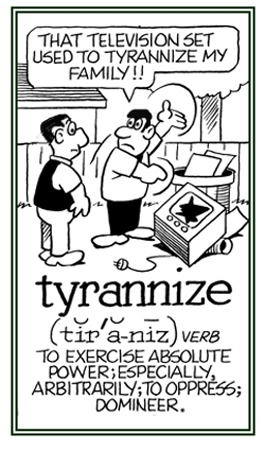tyrann-, tyranni-, tyran-
(Greek > Latin: an absolute ruler; an oppressor, a dictator)
Someone who despises or detests tyranny: The misotyrannists are completely against a government that treats people in a cruel and unjust way by using military or police forces to control them.
Sic semper tyrannis. (Latin phrase)
Translation: "May it ever thus be to tyrants; Thus always to tyrants."
Sic semper tyrannis is the motto of the State of Virginia, U.S.A.
There are some who say these words were shouted by John Wilkes Booth as he leaped to the stage after shooting President Abraham Lincoln. Other witnesses thought he said something else, for example it is said that he added, "The South is avenged."
A female control freak or despot; tyrantess: A woman who conducts herself in an oppressive and cruel way is called a tyranness.
tyrannical, tyrannic (adjective), more tyrannical, most tyrannical; more tyrannic, most tyrannic
1. Descriptive of a person who is harsh, despotic, and arbitrary: Jenny's father became tyrannical with age and so she left her home as soon as possible.
2. Etymology: formed in English from Latin tyrannicus, "like a tyrant, despotic"; from Greek tyrannikos, "of or pertaining to a tyrant"; from tyrannos, tyrant.
2. Etymology: formed in English from Latin tyrannicus, "like a tyrant, despotic"; from Greek tyrannikos, "of or pertaining to a tyrant"; from tyrannos, tyrant.
tyrannicidal (adjective), more tyrannicidal, most tyrannicidal
A reference to the killing of a tyrant: In the book Jane was reading, a tyrannical scheme was being prepared by the angry mob.
1. The slayer of a tyrant: In the story Jim read, the tyrannicide killed the oppressor of his family.
2. The killing of a despot: Tyrannicide describes the slaying of an authoritarian, slave-driver, dictator, etc.
2. The killing of a despot: Tyrannicide describes the slaying of an authoritarian, slave-driver, dictator, etc.
tyrannish (adjective), more tyrannish, most tyrannish
Obsolete, pertaining to an individual who is like a tyrant; tyrannical: Over the years Mary's husband became quite tyrannish and so she decided to leave him and get a divorce.
tyrannize (verb), tyrannizes; tyrannized; tyrannizing
1. To exercise power cruelly or unjustly: Pamela's husband tyrannized her in a very brutal and domineering manner.
2. To rule with absolute power: In some countries, leaders are very similar to dictators and they oppress and tyrannize their citizens without justification.
3. Etymology: from Greek turannos, "a lord, a master, a king"; especially, "an absolute master or ruler."

© ALL rights are reserved.
Go to this Word A Day Revisited Index
2. To rule with absolute power: In some countries, leaders are very similar to dictators and they oppress and tyrannize their citizens without justification.
3. Etymology: from Greek turannos, "a lord, a master, a king"; especially, "an absolute master or ruler."

Go to this Word A Day Revisited Index
so you can see more of Mickey Bach's cartoons.
A hatred of tyrants: Jim, who lived in a country ruled by a dictator, decided to move to a country far away because he had tyrannophobia and didn't want to live under the rulership of an oppressor.
In zoology, one of the dinosaurs in the family Tyrannosauridae: In Finn's book there was a picture of a Tyrannosaurid which was a very large bipedal carnivorous theropod dinosaur that lived in the Late Cretaceous in North America.
Tyrannosauridae (proper noun)
A taxonomic familyof coelurosaurian theropod dinosaurs: The "tyrant lizards" are some of the biggest flesh-eating land animals in the Tyrannosauridae family and are believed to have lived during the Late Cretaceous period.
A very large carnivorous dinosaur of the genus Tyrannosaurus: The Tyrannosaurus is a "tyrant (despot) lizard” from Late Cretaceous western North America and China. This fossil has also been called "Dynamosaurus", "Tarbosaurus", and "Manospondylus". It was named by the U.S. paleontologist Henry Fairfield Osborn in 1905.
The "tyrant lizard king", a giant carnivorous theropod dinosaur from the Upper Maastrichtian, the last stage of the Cretaceous period, 65 to 66 million years ago: Tyrannosaurus rex is probably the best-known carnivorous dinosaur, particularly because it is believed to be the largest to have ever existed.
The large carnivorous bipedal dinosaur had enormous teeth with knifelike serrations and may have been a scavenger rather than an active predator.
tyrannous (adjective), more tyrannous, most tyrannous
Despotic: dictatorial: Since Jane's boyfriend turned out to be quite tyrannous and oppressive, she left him and moved to another town.
The state or quality of oppression or authoritarianism: Mr. Todd's tyrannousness by treating all his family members unjustly was getting worse day by day and finally his wife and children left him and moved to another city. .
Cross references of word families related directly, or indirectly, to: "master, lead, leading, ruler, ruling, govern": -agogic; agon-; arch-; -crat; dom-; gov-; magist-; poten-; regi-.
Showing page 1 out of 2 pages of 17 main-word entries or main-word-entry groups.

